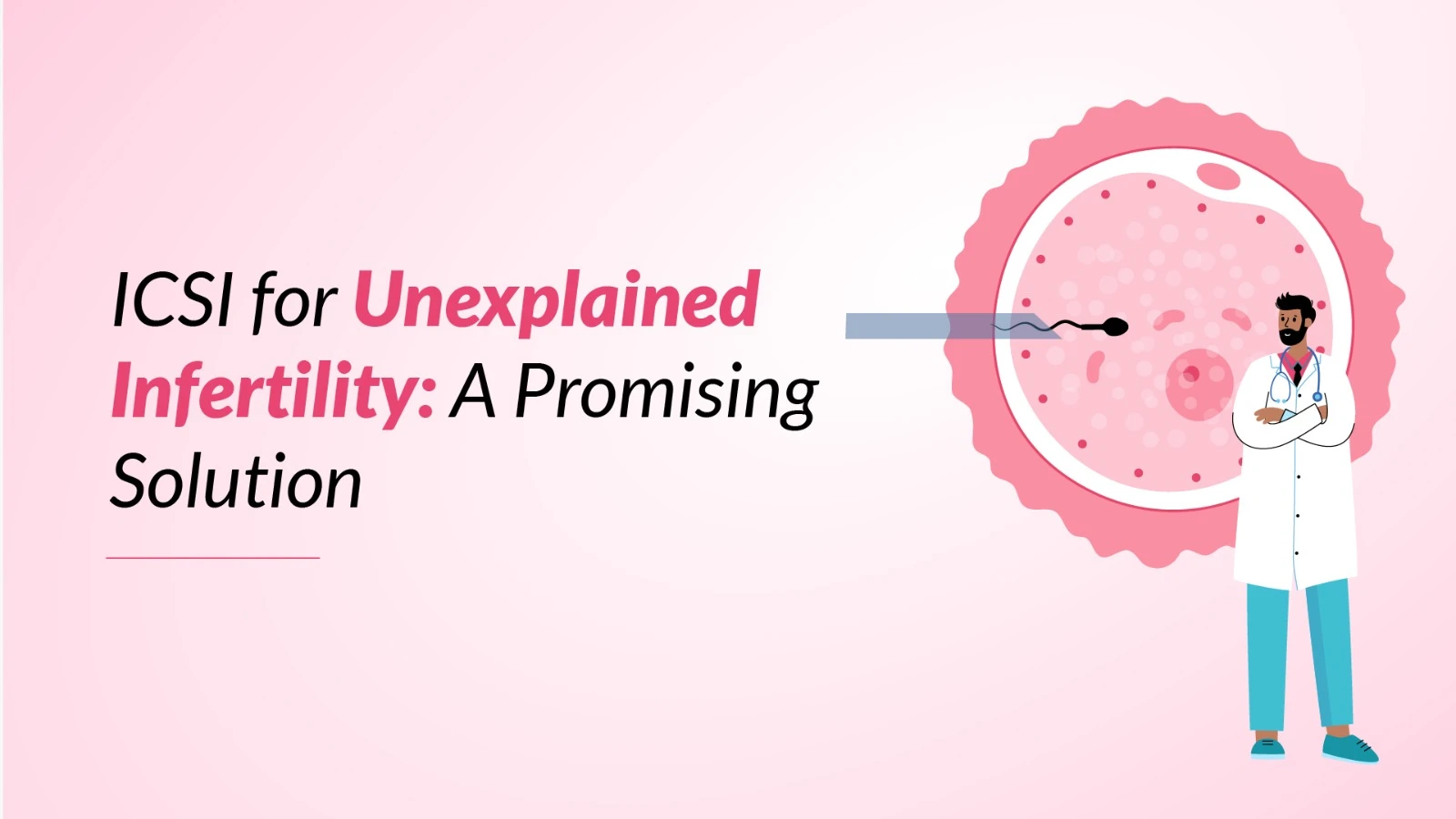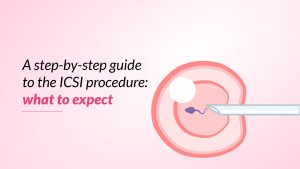Intracytoplasmic Sperm Injection (ICSI) is an innovative reproductive procedure that provides hope to couples suffering from unexplained infertility. ICSI overcomes normal fertilization hurdles by inserting a single sperm straight into an egg, bypassing issues such as sperm motility, morphology, or any subtle barriers to fertilization that might prevent natural conception. This procedure has shown to be a potential treatment for many couples who are unable to conceive while having unexplained infertility.
What is Unexplained Infertility?
The term unexplained infertility means that a couple faces difficulties conceiving without any identifiable medical reason, despite normal fertility test results for both partners. Infertility in men accounts for roughly 30%–40% of infertility cases, while infertility in women accounts for 40%–50%. Unexplained infertility is diagnosed only after both spouses have undergone thorough fertility examinations. This diagnosis is usually provided after extensive testing fails to establish the reason for infertility. 30 percent of infertile couples globally are diagnosed with unexplained or idiopathic infertility, which is characterized by the inability of the female to conceive after at least 12 cycles of unprotected sexual activity or after six cycles in women over 35 who meet all standard evaluation criteria. Unexplained infertility can be especially stressful for couples since it provides no information about specific issues or focused treatment. However, individuals impacted may have a better chance of becoming pregnant with the help of fertility procedures like ICSI, IVF, and lifestyle modifications.
Common Causes of Unexplained Infertility
The causes of unexplained infertility are mostly unclear, which can be extremely distressing for couples searching for solutions. However, there are a number of possible causes for infertility that cannot be explained:
- Subtle Hormone imbalances: While some hormone imbalances are difficult to identify with traditional tests, they may still have an impact on fertility.
- Ovulation Irregularities: Even if a woman seems to have ovulation on a regular basis, small irregularities might have an influence on female fertility.
- Sperm Function: Even if sperm count and quality are within normal ranges, sperm function concerns may still arise.
- Fallopian Tube Function: While the fallopian tubes may appear healthy, they could have minor abnormalities that prevent the fertilization process.
- Immune System Dysfunction: Some specialists believe that an excessive or inappropriate immune response may impair fertility.
- Lifestyle Factors: Stress, poor diet, and exposure to environmental pollutants may all contribute to unexplained infertility.
The Psychological Impact of Unexplained Infertility
Both partners may experience mental and social anguish as a result of unexplained infertility. Couples frequently feel depressed, angry, guilty, and sad, and these emotions can be made worse by social pressures related to having children. Mental health support is essential for managing the financial hardship of infertility treatments and the uncertainty of results, which can exacerbate anxiety and strain relationships.
What is ICSI, and why is it effective for unexplained infertility?
Intracytoplasmic sperm injection (ICSI) is a procedure used during in vitro fertilization (IVF), where a single sperm is injected directly into the egg for the purpose of fertilization. ICSI can increase the likelihood of conception for couples who had poor fertilization in a prior IVF cycle and is a safe and successful technique for couples with male factor infertility. ICSI for unexplained infertility works well because it injects a single sperm into the egg directly, avoiding any minor problems with fertilization that can go unnoticed in standard testing. This method may work around problems like minor sperm defects or unidentified obstacles to sperm-egg contact. According to studies, ICSI increases the rate of conception and gives hope to couples experiencing unexplained infertility.
Success Rates of ICSI for Unexplained Infertility
By promoting fertilization during IVF procedures, ICSI procedures have demonstrated success in some cases of unexplained infertility. Although research on ICSI’s ability to increase live birth rates in situations of unexplained infertility has yielded conflicting results, CDC reports indicate that it can increase fertilization rates in male factor infertility when traditional IVF fertilization rates are low. Even though the ICSI procedure might not always improve results for unexplained infertility, it is still a good choice in complicated situations where problems with fertilization continue after regular IVF methods.
Factors that Influence ICSI Success Rates
The age and reproductive health of the female partner, the quality of the sperm, and the embryologist’s skill level can all affect the success rates of ICSI. Both advanced mother age and low sperm or egg quality, which impact embryo viability, can reduce success rates. Additionally, the experience and technique of the fertility clinic play a significant role in outcomes for ICSI treatments.
When Should You Consider ICSI for Unexplained Infertility?
In cases of unexplained infertility, when there is a history of fertilization failure with traditional IVF, poor-quality oocytes, or advanced maternal age, consider intracytoplasmic sperm injection (ICSI). If prior attempts at intrauterine insemination (IUI) or natural pregnancy have failed, ICSI may also be helpful. As a result, a comprehensive assessment by a fertility specialist is necessary to ascertain the best course of treatment, depending on specific circumstances.
Benefits of ICSI for Unexplained Infertility
ICSI increases fertilization rates by injecting sperm directly into the egg, providing certain advantages for couples with unexplained infertility. This method circumvents possible unidentified obstacles to conception, offering a successful remedy.
Targeted Fertilization
In order to increase the success of fertilization, targeted fertilization is the exact process of inserting a single sperm into an egg. This approach is particularly helpful in treatments like ICSI for cases of unexplained infertility.
Higher Egg Utilization Rates
During procedures such as ICSI, higher egg utilization rates increase the probability of successfully collecting and fertilizing multiple eggs, maximizing the number of viable embryos available for transfer.
Reduced Risk of Genetic Disorders
Pre-implantation genetic testing, which is frequently used in conjunction with ICSI, is one assisted reproductive technology that can screen for genetic abnormalities, lowering the chance of hereditary concerns and ensuring healthier embryos for transfer.
Flexibility in Treatment Options
As ICSI offers a variety of treatment choices, couples can tailor their fertility strategies to meet their unique needs by combining them with other assisted reproductive technologies like IVF, embryo freezing, or genetic testing.
Suitable for Various Infertility Causes
The ICSI procedure is a flexible option for reproductive treatments since it can be used to treat a variety of infertility problems besides male factor infertility, such as unexplained infertility, low egg production, or prior IVF failures.
Psychological Benefits for Couples
Given the ICSI procedure offers an active treatment and greater odds of conception, couples undergoing the procedure have psychological benefits such as increased hope and decreased stress, which serves to lighten the mental burden of unexplained infertility.
Conclusion
With increased possibilities of fertilization and conception, ICSI is a valuable option for couples dealing with unexplained infertility. ICSI can change the path to motherhood by removing tiny obstacles to conception, giving people new hope and self-determination. Because of its accuracy and adaptability, the treatment is a great choice for people who have tried every other approach. In addition to being a treatment, ICSI is a viable route for many couples to realize their aspirations of starting a family.




























